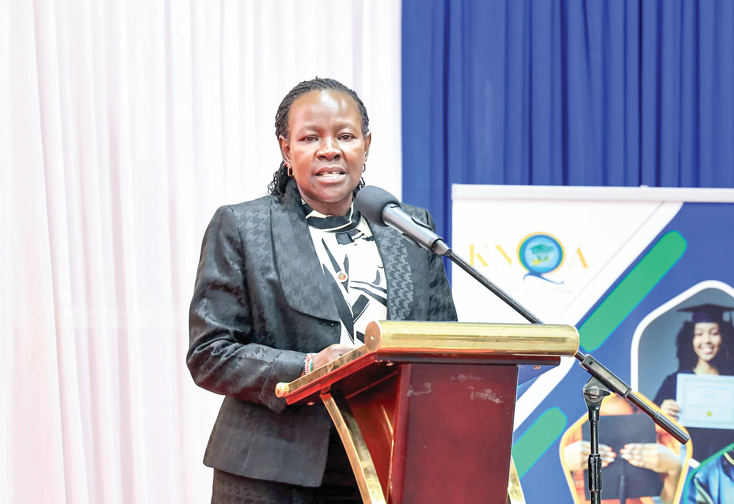It’s ‘harebrained’ idea to bar office love, judge rules

The High Court yesterday awarded a former G4S employee Sh3.2 million for unfair dismissal, ruling that employers have no legal basis for prohibiting romantic relationships or marriages between consenting employees.
Workplace romances must be left to run their natural course, ruled Justice James Rika, saying policies that bar workplace sexual relationships are unconstitutional.
Primarily, the judge said, they constitute a serious invasion of the privacy rights of employees, which are protected under Article 31 of the Constitution. The article states that every person has the right to privacy, and sexual relationships are private, he affirmed.
“It is a harebrained law or policy that would seek to outlaw the affairs of the heart. Employers must leave Bill and Melinda Gates within their undertakings to grow, and to find themselves in each other, while they continue to be productive to the business,” the judge said.
’Unfair termination’
The case arose when a former G4S operations branch manager sued the company for unfair termination on the grounds that he had sexually harassed a female junior employee.
Prohibiting employees from following their hearts, the judge said, would amount to a violation of their fundamental freedom from cruel, inhuman or degrading treatment under Article 25 [a] of the Constitution.
“Nothing is more degrading than for a third party, an employer, to intermeddle in a love relationship between two consenting adult employees,” Rika said.
If the relationship between the claimant and the woman resulted in a conflict of interest, he ruled, that G4S should have charged the manager with infringing the conflict of interest policy.
But the manager was not investigated or dismissed for any conflict of interest, the court said.
In clause 15 of the company’s Sexual Harassment Policy, the judge noted, that G4S compounds constitutional violations by requiring that married employees disclose their marriage to the company and that if the marriage occurred after November 2020, one of the spouses should resign from the company.
The company’s policy adopted the definition of sexual harassment provided in Section 6 of the Employment Act. Its purpose is to provide employees with information and intervention strategies designed to make everyone aware of conduct that could constitute sexual harassment.
Finding that the manager had been fired unfairly, the judge said G4S did not provide a valid reason to justify the termination of the manager’s contract.
Sections 43 and 45 of the Employment Act were not honoured,” he said.
The manager was hired on March 3, 2000, and his contract was terminated on December 22, 2020. At the time he was sacked, he had eight years before he could retire.
The manager, the court noted, was not shown to have caused or contributed to the circumstances that led to the premature termination of his contract.
“It is declared that termination was unfair, for lack of a valid reason. The claimant is granted compensation for unfair termination, [the] equivalent of twelve months’ salary, at Sh3,244,800,” the judge ruled.
The manager sued G4S in 2021 for sacking him. He had been hired as a management trainee in 2000 and was appointed acting district manager in Nakuru in 2001.
In 2018, he was appointed regional operations manager and was stationed in Nairobi. He was still holding this position when the company terminated his contract in December 2020.
His last gross monthly salary was Sh270,400. The month before his sacking, he had been issued with a letter asking him to explain why disciplinary action should not be taken against him.
He was alleged to have influenced the irregular transfer of a junior guard to a different assignment, making sexual advances to her, and engaging in the borrowing and lending of money with her.
DNA testing
He denied the allegations and the company’s human resources director directed him to undergo DNA testing, using his own resources, to establish if he had fathered the daughter of the junior employee.
It was alleged that he had a sexual relationship with the guard that resulted in the birth of the girl.
The DNA test was negative but G4S still terminated his contract on allegations of sexual harassment.
“The transfer of the guard was within the docket of the Customer Service Manager [CSM]. The claimant did not influence her transfer,” the judge stated.
“She returned from maternity leave and reported to her CSM, Peter Gakuo, who only sought from the claimant if it was alright to transfer her to Coca-Cola Upper Hill. Coca-Cola had placed a request to the company for a female guard, to serve as a receptionist.”
The guard was reportedly dismissed by G4S for providing false information to the company that the manager had sired her daughter.
The manager was, nonetheless, dismissed on the strength of the same false information.
He accused G4S of failing to follow its own disciplinary policy, the Employment Act and the Constitution. He said there was no valid reason shown to justify his termination.
The procedure, he argued, was fundamentally flawed and that the disciplinary committee had an interest in the outcome.
G4S, however, told the court that the manager’s termination was fair and based on valid reasons.
The company maintained that the manager engaged in sexual harassment, contrary to its Africa region employee handbook.
“The clause bars all cadre of staff from influencing or attempting to influence an employee’s employment status by coercing an employee to surrender to sexual advances,” the judgement says.









